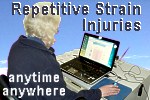
Repetitive Strain Injuries

an ounce of prevention saves a ton of regret
Before the science of ergonomics came along, people accepted that certain tasks always caused pain and discomfort. Sufferers grumbled, then carried on regardless - a sore back, stiff neck, or tennis elbow were thought of as occupational hazards. We know now that many of these can be avoided by giving consideration to the way things are done. Unfortunately, time restraints and the desire for increased efficiency and profitability frequently outweigh the health risks. When doing it the right way means paying out for specialised equipment which, in turn, calls for a new method that might take twice as long, employers will baulk at the prospect. Quite a few workers who take a pride in their jobs will also see no need to fix something that isn't really broken. Older, wiser and a few visits to the physio later, they may have second thoughts, having to agree that old habits and complacency have served up medical conditions they are stuck with, perhaps for the rest of their lives.
Strenuous physical activities are the cause of many permanent injuries, even though they come with warnings that we've all heard before. It should go without saying that a straight back, knees bent and use of the leg muscles is the best method for lifting heavy loads - weight-lifters do it all the time; we, however, who aren't athletes, ignore the advice. Maybe we just don't think, and when we do it's about the job in hand and getting it done quickly with no time for elaborate procedures. When a fair amount of effort is required to complete a particular task, the chance of an eventual medical complication as a result is pretty much expected. When it finally happens, we give ourselves a kick in the pants as a reminder that we must now pay the price for past stupidity. Those not engaged in heavy manual labour probably assume they are immune and don't need to worry. The truth is that everyone risks injury by performing tasks that are repeated throughout the day, every day. Jobs like filing, data entry, production-line work in a light industry, even playing video games can result in prolonged suffering and permanent damage if they aren't performed with continuing good health in mind.
Repetitive strain injuries are caused by continually repeating an action over an extended period in exactly the same way; often the wrong way. This results in damage to soft tissue, possible displacement of joints, and skeletal disfigurement. Students carrying unsuitable backpacks loaded with books to and from school each day risk neck, back and shoulder problems. Discomfort of this nature may be shrugged off as unimportant because it is only temporary, but the strain on young bodies that are still growing can result in permanent deformities that will affect them in later life. Parents have to pick up and carry young children throughout the day, every day - they just accept it as part of the job along with the resultant aches and pains. Many of our ageing community walk with a stoop, hardly surprising after years of toting this and lifting that. Despite the examples, we seem to be very slow on the uptake, failing to realise that we would be better off learning from someone else's mistakes to avoid making our own.
As more workers become patients, employers will eventually have to concede that something must be done to improve conditions. Unfortunately, very few seem prepared to implement changes of their own volition. They wait until litigation forces it on them. A replacement employee and some costly alterations later, they can carry on pretty much the same as before. Their former worker, however, is now out of a job and unlikely to get a similar position because their permanent injury makes simple tasks too painful or physically impossible. Then there's the stigma attached to a person who thought it necessary to wrangle for compensation in a court of law. Any future employer wouldn't want to go down the same road and would be reluctant to give that person a chance. The progression from this point isn't good. Unless they can secure some kind of meaningful employment that they are capable of doing without making their condition worse, the sufferers of work-related injuries quickly lose faith in themselves.
Click this ![]() image to view or print complete article.
image to view or print complete article.
Money Health Focus Popcorn Recipes eBooks About Contact
copyright © 2011-2015 All Rights Reserved